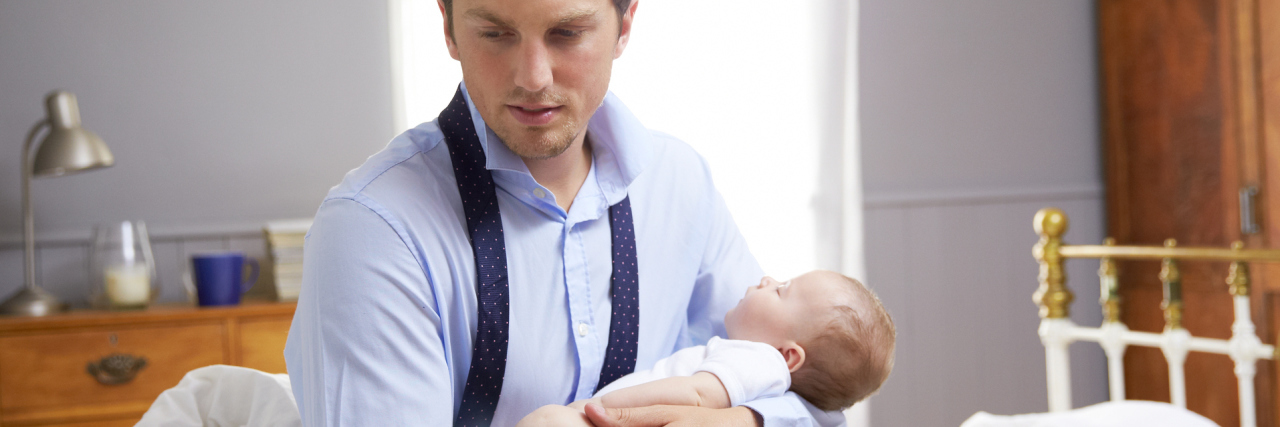If you had asked me in 2003 if depression exists, I wouldn’t have told you an answer until it came to my door the following year.
It was after having a panic attack in the labor ward, thinking both my wife and unborn baby were going to die, that something changed in me. I didn’t know what the nightmares were about and would wake up thinking they had died.
My wife, Michelle, went on to have severe postpartum depression. She should have been put in a mother and baby unit for her own safety, but I give up work to look after them. It was hard not telling anyone; I kept it to myself. Seeing someone you love go through this illness was horrible.
The next few months changed my own mental health, and I was becoming depressed myself. I didn’t have an education around the symptoms and was never asked how I was feeling, but all I cared about was Michelle being well and getting back to having a social life, as it felt we were in a bubble.
I was now starting to worry about how we going to pay the mortgage and being self-employed, I was earning nothing. We had to use credit cards. I couldn’t tell anyone how I was feeling as I didn’t want it to impact on Michelle’s health, and I worried social services would take our beautiful baby boy away.
My personality totally changed around four to five months after the baby was born. I became angry, drinking more and isolating myself from others. I even started fights with the doorman, not that I was big enough to beat them — I just wanted them to hurt me, to stop the feeling I was experiencing for the first time at 30 years of age. I was having suicidal thoughts daily and was thinking I wasn’t good enough to be a dad.
I broke my hand hitting the sofa around this time, and hated not knowing how long we were going to live like this after being so happy. We had done so much traveling and were enjoying life, yet now we couldn’t get out of the house some days.
See, I didn’t get that overwhelming feeling of love I was expecting after my son was born; I was just relieved they were both alive. One of the positives to come out of staying home was my bonding and attachment to my son, which got better due to being home for six months. After Michelle got treatment and was better, I found it hard — it was as if it was the first time I could relax, resulting in low mood.
For years, I was the same happy-go-lucky guy. After other events — both losing my grandfather, then my mother being diagnosed with cancer in the space of weeks — I finally couldn’t cope. I had a breakdown in 2011.
It was the start of my own recovery. I started campaigning that year. I soon became a public speaker and founder of the charity Fathers Reaching Out. I was soon on television and radio, campaigning for all parents to be supported during the postnatal period.
I also found, after being in community mental health services, that I had a disorder I managed to cope with all my life — attention-deficit/hyperactivity disorder (ADHD). This is one of the reasons why we should screen dads who have a history of mental illness or disorders, just like we do with mothers.
Today, both my wife and I changed our careers from working in big blue chip companies earning big money to working in this field to help others. I also work in setting up new projects and founded International Fathers’ Mental Health Day in 2016, which is growing every year.
People may think I am a father’s mental health campaigner. Well, I am not; I campaign for all parents. It’s simple — in 2011, no one was talking about the father, so I decided to. You see, if one partner is struggling, that impacts on the other’s mental health, which can affect the development of their child. When I had my breakdown, Michelle’s depression came back again but now we are stronger and more educated than ever.
If there’s one piece of advice I can give you, it’s a simple one I wish I knew years ago. The quicker you speak out and get help, the quicker the recovery.
— Mark Williams
Follow this journey at Fathers Reaching Out
If you or a loved one is affected by postpartum depression or other postpartum disorders and need help, you can call Postpartum Support International‘s hotline at 1-800-944-4773.
If you or someone you know needs help, visit our suicide prevention resources page.
If you need support right now, call the National Suicide Prevention Lifeline at 1-800-273-8255, the Trevor Project at 1-866-488-7386 or text “HOME” to 741-741. Head here for a list of crisis centers around the world.
We want to hear your story. Become a Mighty contributor here.
Thinkstock photo via monkeybusinessimages

